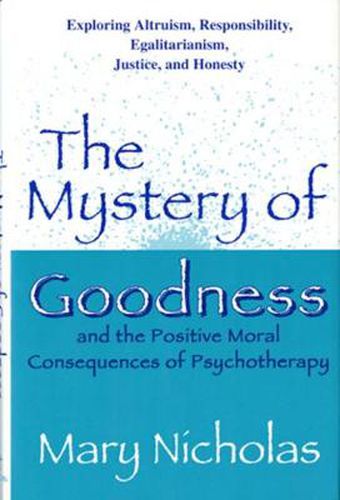Readings Newsletter
Become a Readings Member to make your shopping experience even easier.
Sign in or sign up for free!
You’re not far away from qualifying for FREE standard shipping within Australia
You’ve qualified for FREE standard shipping within Australia
The cart is loading…






In a society that oscillates wildly between extremes of moralizing and corruption, how do we define, much less foster, goodness ? Mary Nicholas, in this engaging and provocative book, explores the relationship between psychotherapy and the enhancement of goodness. She examines the field of psychotherapy, which frequently strives for moral neutrality, and explains how neglecting morality can actually stymie its goals. Goodness is defined here as concern for others and is represented by five generally accepted virtues - altruism, responsibility, justice, egalitarianism, and honesty. The process of psychotherapy is examined in light of how it may promote or diminish these attributes in patients. The first section, Reconciling Goodness with Psychology and Psychotherapy,
conceptualizes goodness in psychological terms. Section Two, The History of Goodness,
synthesizes various theories pertaining to goodness from the perepectives of science, developmental psychology, behavioral and social psychology, and psychoanalysis. The third section, From Demoralization to Remoralization through Psychotherapy,
discusses the moral aspects of different mental and emotional illnesses and their treatment. The book explores not only the morality of clients, but also the moral role of the therapist and how this is shaped by specific biases toward amorality, which are inherent in Western culture and science. Nicholas believes that therapy can have positive moral results, from loving more and better to the search for truth and the pursuit of life over death, as well as mutuality in personal relationships and the larger community. Each chapter contains lively clinical anecdotes from individual, couples, and group therapy to illustrate the points made. Attention is paid throughout the book to how moral issues can be addressed in therapy without shaming the client.
$9.00 standard shipping within Australia
FREE standard shipping within Australia for orders over $100.00
Express & International shipping calculated at checkout
In a society that oscillates wildly between extremes of moralizing and corruption, how do we define, much less foster, goodness ? Mary Nicholas, in this engaging and provocative book, explores the relationship between psychotherapy and the enhancement of goodness. She examines the field of psychotherapy, which frequently strives for moral neutrality, and explains how neglecting morality can actually stymie its goals. Goodness is defined here as concern for others and is represented by five generally accepted virtues - altruism, responsibility, justice, egalitarianism, and honesty. The process of psychotherapy is examined in light of how it may promote or diminish these attributes in patients. The first section, Reconciling Goodness with Psychology and Psychotherapy,
conceptualizes goodness in psychological terms. Section Two, The History of Goodness,
synthesizes various theories pertaining to goodness from the perepectives of science, developmental psychology, behavioral and social psychology, and psychoanalysis. The third section, From Demoralization to Remoralization through Psychotherapy,
discusses the moral aspects of different mental and emotional illnesses and their treatment. The book explores not only the morality of clients, but also the moral role of the therapist and how this is shaped by specific biases toward amorality, which are inherent in Western culture and science. Nicholas believes that therapy can have positive moral results, from loving more and better to the search for truth and the pursuit of life over death, as well as mutuality in personal relationships and the larger community. Each chapter contains lively clinical anecdotes from individual, couples, and group therapy to illustrate the points made. Attention is paid throughout the book to how moral issues can be addressed in therapy without shaming the client.